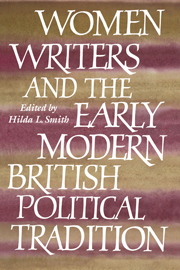Book contents
- Frontmatter
- Contents
- List of contributors
- Preface
- Introduction: Women, intellect, and politics: their intersection in seventeenth-century England
- Part I Women's political writings, 1400–1690
- Part II Women's political and philosophical writings, 1690–1800
- Introduction to Part II
- 5 Astell, Masham, and Locke: religion and politics
- 6 The politics of sense and sensibility: Mary Wollstonecraft and Catharine Macaulay Graham on Edmund Burke's Reflections on the Revolution in France
- 7 Mary Wollstonecraft on sensibility, women's rights, and patriarchal power
- 8 Emilie du Châtelet: genius, gender, and intellectual authority
- Part III The intellectual context and economic setting for early modern women
- Part IV Early modern legal and political prescriptions for women
- Conclusion: women's writing, women's standing: theory and politics in the early modern period
- Index
6 - The politics of sense and sensibility: Mary Wollstonecraft and Catharine Macaulay Graham on Edmund Burke's Reflections on the Revolution in France
from Part II - Women's political and philosophical writings, 1690–1800
Published online by Cambridge University Press: 04 August 2010
- Frontmatter
- Contents
- List of contributors
- Preface
- Introduction: Women, intellect, and politics: their intersection in seventeenth-century England
- Part I Women's political writings, 1400–1690
- Part II Women's political and philosophical writings, 1690–1800
- Introduction to Part II
- 5 Astell, Masham, and Locke: religion and politics
- 6 The politics of sense and sensibility: Mary Wollstonecraft and Catharine Macaulay Graham on Edmund Burke's Reflections on the Revolution in France
- 7 Mary Wollstonecraft on sensibility, women's rights, and patriarchal power
- 8 Emilie du Châtelet: genius, gender, and intellectual authority
- Part III The intellectual context and economic setting for early modern women
- Part IV Early modern legal and political prescriptions for women
- Conclusion: women's writing, women's standing: theory and politics in the early modern period
- Index
Summary
When this Right Honorable Author first threw down the gauntlet, and entering the ground from whence Sir Robert Filmer was forced so shamefully to retire, stood forth the champion of hereditary right, he undoubtedly expected to be opposed by all those men, who in a liberal and enlightened age, had ranged themselves on the side of liberty; but how deeply must it wound the feelings of a chivalrous knight, who owes the fealty of “proud submission and dignified obedience” to the fair sex, to perceive that two of the boldest of his adversaries are women!
Analytical Review, 1791At the end of the eighteenth century Mary Wollstonecraft and Catharine Macaulay were considered by their contemporaries to be among Edmund Burke's “boldest adversaries.” Wollstonecraft's A Vindication of the Rights of Men was the first published reply to the Reflections on the Revolution in France as well as the pioneering feminist's earliest argument for equal rights and democratic government. Macaulay's Observations on the Reflections of the Right Honorable Edmund Burke, on the Revolution in France represented the last volley in a war of words between the celebrated republican historian and the famed parliamentarian. In this chapter I argue that by using the notions of sense and sensibility we are better able to understand how Wollstonecraft and Macaulay challenged the gender and class hierarchy of the Reflections. These terms played a central part in each woman's rhetorical strategy and made it possible for both to invert the gender logic of the Reflections.
- Type
- Chapter
- Information
- Women Writers and the Early Modern British Political Tradition , pp. 126 - 147Publisher: Cambridge University PressPrint publication year: 1998
- 3
- Cited by



